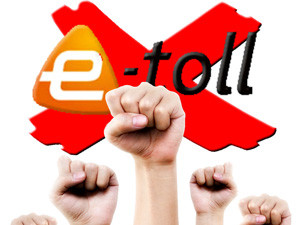
The 2007 intelligent number plate project for Gauteng - that was repeatedly delayed before finally failing to launch around 2011 - may have ties to the controversial e-tolling system, which now looks set to proceed after a series of delays of its own.
The electronic number plate system would have seen number plates being fitted with RFID tags containing unique identification codes programmed into a 2D barcode that traffic authorities would have been be able to scan. A paper licence disc, fitted with an electronic chip for identification, was also part of the plan. The identification would have necessitated scanning equipment, as well as infrastructure such as the e-toll gantries now disperse across Gauteng's highways.
According to Democratic Alliance (DA) Gauteng caucus leader Jack Bloom, a confidential document outlining the Gauteng Transport Information System's integration of electronic vehicle identification via smart number plates and paper licence discs alludes to the e-toll system. The "secret" document predates when the proposed e-tolling system was made public.
Taken for granted
"If you look at the document, it is based on the premise that the [e-tolling] system would go ahead," says Bloom - an indication that it was taken for granted e-tolls would go ahead despite the public's input and reaction.
Bloom says e-tolling was, from the beginning, part of a much broader plan - a plan that was poorly planned, has potential for financial gain for certain interests and that turns local motorists into huge "cash cows".
As it stands, says Bloom, the whole process has been shrouded in secrecy. "The full story has yet to be told." He says the public does not know the details of the broader transport plan, or why intelligent plates disappeared off the radar. Bloom says there was also at one stage consideration of a broadband network for e-tolling and traffic monitoring.
"I have seen the document, and it raises suspicion. It shows that the public was never taken into account and that they were always going to be a cash cow for government's [IT-based] transport plans."
DA Gauteng transport spokesperson Neil Campbell says, while the original intention with the Department of Transport's (DOT's) intelligent number plate system was purely to alleviate the problem that number plate IDs were running out, there was already an indication that an e-toll system would need to be in place.
He says, however, the whole system is "illogical" in its massive costs and public opposition. Campbell says motorists are already paying more than double tax, with the fuel levies that are constantly hiked and the provisional licence fees.
Awaiting e-tolls
Meanwhile, recent developments and the DOT indicate the e-toll system will be rolled out soon.
The National Assembly last week okayed a Bill fundamental to the implementation of open road tolling in Gauteng, and now the department awaits president Jacob Zuma's penned approval, before starting the e-toll process, despite widespread disapproval.
After the Opposition to Urban Tolling Alliance's (Outa's) High Court application to scrap e-tolling was dismissed in December, the alliance applied for leave to appeal the judgement that deemed e-tolls legal. Leave to appeal was granted in January.
Outa's appeal will be taken to the Supreme Court of Appeal, in Bloemfontein, at a date yet to be set.
Outa chairperson Wayne Duvenage says word from the alliance's legal team indicates the appeal date could only be around September or October. "We don't know for sure right now, but what we do know is that the SA National Roads Agency can go ahead with e-tolling despite the pending case."
The DOT had not commented by the time of publication.
Share